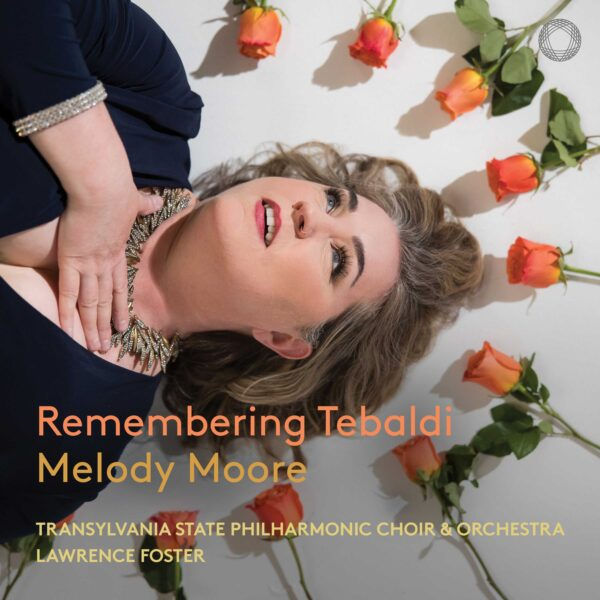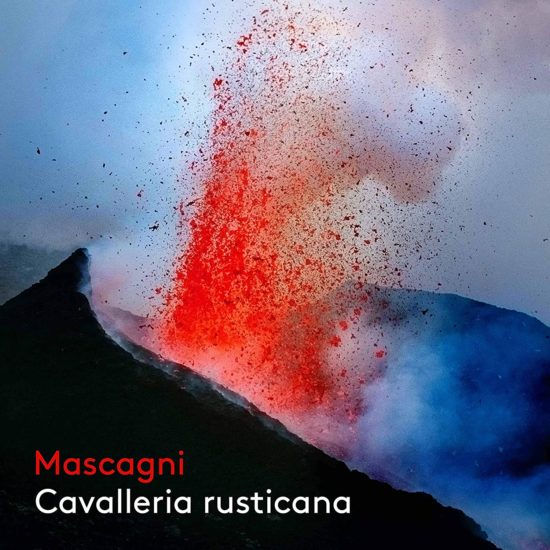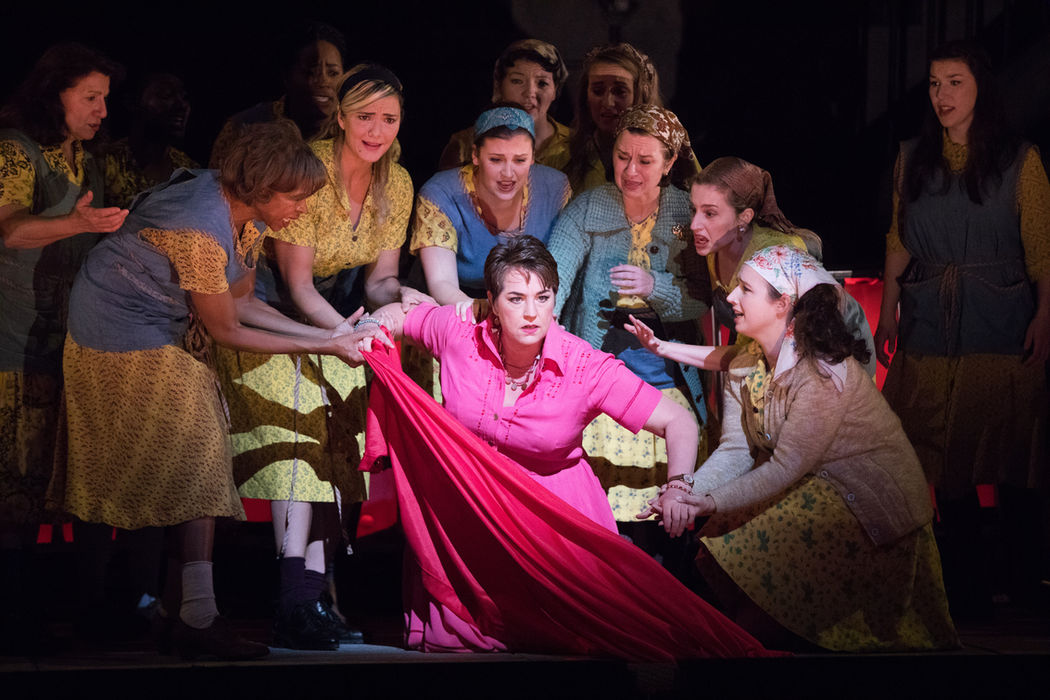
MELODY MOORE
SOPRANO
BIOGRAPHY
Soprano Melody Moore is enjoying a thriving career on the world’s leading stages, prompting Opera News to label her “a revelation,” and of her sold-out appearance at Carnegie Hall to rave, “As I left the auditorium, I could only think: more of Moore, please.”
Last season, Ms. Moore joined New Orleans Opera to sing the title role in Tosca before making her role and company début as Helen Douglass in Ulysses Kay’s final opera Frederick Douglass with Odyssey Opera and Boston Modern Opera Project. This prolific work was brought back to the stage after nearly 35 years and will receive its first commercial recording to be released in 2026. She also sang the role of the Hostess in Gordon Getty's Plump Jack in a new recording and is currently filming the opera with Sunset Entertainment in Los Angeles to be released in 2026. Additionally, Ms. Moore took to the concert stage as a soloist in Mahler’s Symphony No. 2 with Targu Mures Philharmonic State Orchestra, sang Verdi’s Requiem with Transylvania State Philharmonic and The Romanian National Opera Cluj-Napoca, and appeared in a Puccini Gala concert with the Dinu Lipatti State Orchestra. This season, she returns to the Transylvania State Philharmonic for a concert of Beethoven’s Fidelio.
READ MORE
Ms. Moore recently joined the Baltimore Symphony for Zemlinsky’s Lyric Symphony, the Los Angeles Master Chorale for Verdi’s Requiem, and headed back into the studio for two projects: a new recording with San Francisco Classical Recording Company, singing the title role in Norma; and a new recording of Gordon Getty’s opera Goodbye Mr. Chips as Kathie/Linford. She also enjoyed a triumphant return to Los Angeles Opera, repeating her tremendous success in the role of Amneris in Aida opposite Latonia Moore in the title role and tenor Russell Thomas as Radamès. Concert highlights have included Beethoven’s Symphony No. 9 with the Minnesota Orchestra under the baton of Juraj Valčuha and the Mother in Hänsel und Gretel with the Atlanta Symphony Orchestra, with Sir Donald Runnicles at the helm. We also saw the release of Moore’s interpretation of the title role in Madama Butterfly (available on Pentatone) and the recording of a critically acclaimed concert of Tosca, captured live in Berlin, Germany. Moore made a much-anticipated return to San Francisco Opera as Mère Marie in the Olivier Py production of Dialogues des Carmélites, and she made her role début as Alice Ford in Falstaff in concert with the Polish National Radio Symphony Orchestra in Katowice, Poland.
Ms. Moore has continued to remain active in the recording studio, marking the 100th anniversary of the birth of legendary soprano Renata Tebaldi with the newly released Remembering Tebaldi, an album featuring selections from the Italian repertoire for which she was most famous. She also sang Kathie/Linford in the world premiere recording of Gordon Getty’s opera Goodbye, Mr. Chips.Despite several postponements and cancelled productions due to COVID closures, the period offered Ms. Moore an opportunity to focus on recording projects, and the resulting releases of Cavalleria rusticana and La fanciulla del West (both released on the Pentatone label) have been widely praised by reviewers and consumers alike.
Highlights of recent seasons include her début as Amneris in a new production of Aida, reprising the role of Senta in the season opening production of Die fliegende Holländer led by Music Director Patrick Summers, and Donna Elvira in Don Giovanni in a new production by Kasper Holten, all with Houston Grand Opera; returning to LA Opera for a role début as Gertrude (Mother) in Hänsel und Gretel under the baton of Music Director James Conlon; three major role débuts: Elisabetta in Don Carlo at Washington National Opera, the title role in Salome at Florida Grand Opera, and Tatyana in Eugene Onegin at Hawaii Opera Theatre; and singing her signature roles of Tosca in a return to Opéra de Montréal and Senta in Der fliegende Holländer in a new production by Tomer Zvulun at The Atlanta Opera. Her portrayal of Desdemona in a full recording of Otello was also released by Pentatone.
Concert highlights included her début with the Houston Symphony Orchestra in Mahler’s Das klagende Lied under the baton of Music Director Andrés Orozco-Estrada; a début with the Dresdner Philharmonie in the roles of Giorgetta in Il tabarro and Santuzza in Cavalleria rusticana, both of which were recorded for commercial release by Pentatone; Senta with the Milwaukee Symphony Orchestra, under the baton of Music Director Edo de Waart; a début with the Grant Park Music Festival for Delius’ A Mass of Life; and the title role in Salome in Daegu, South Korea.
Other recent career highlights include a house and role début at Seattle Opera in the title role of Katya Kabanova; appearances with San Francisco Opera in the title role of Tosca, Susan Rescorla in Heart of a Soldier, Mimì in La bohème, and the Countess in Le nozze di Figaro; Houston Grand Opera as Julie in Show Boat, Marta in the American premiere of The Passenger, the title role in Carmen, and Dorabella in Così fan tutte; Washington National Opera as the title role in Florencia en el Amazonas, Phillip Glass’ Appomatox, and in Francesca Zambello’s highly acclaimed production of Wagner’s full Ring cycle; LA Opera as Tosca, the Countess in Le nozze di Figaro, and in productions of Der Zwerg and Der Zerbrochene Krug; Opéra de Montréal as Cio-Cio-San in Madama Butterfly; Glimmerglass Festival as Lady Macbeth in Macbeth and Senta in Der fliegende Holländer; Lincoln Center Festival in The Passenger; English National Opera as Mimì in La bohème and as Marguerite in Faust; New York City Opera as Rita Clayton in the New York premiere of Séance on a Wet Afternoon and as Regine St. Laurent in Rufus Wainwright’s Prima Donna; and Austin Lyric Opera as Senta in Der fliegende Holländer. Additional performances include the title roles of Manon Lescaut at New Orleans Opera, Tosca with the Lyric Opera of Kansas City, Pamina in Die Zauberflöte at Opéra de Bordeaux, and Donna Elvira in Don Giovanni with The Atlanta Opera and Opera Colorado.
On the concert stage, Ms. Moore has appeared with the Atlanta Symphony Orchestra for Bruckner’s Te Deum led by Music Director Donald Runnicles; Bard SummerScape Festival as the title role in Turandot; and Bavarian Radio Symphony in performances and a recording of excerpts of Gordon Getty’s opera Plump Jack conducted by Ulf Shirmer, which she also sang with the New Century Chamber Orchestra conducted by Nadja Salerno-Sonnenberg. She has also joined Rufus Wainwright for gala concerts at the Kimmel Center in Philadelphia and at Roy Thomson Hall in Toronto. A Master of Music graduate of the Cincinnati College-Conservatory of Music, Melody Moore is a former Adler Fellow of San Francisco Opera and an alumnus of the prestigious Merola program.
Current as of September 1, 2025
CRITICAL ACCLAIM
"...unleashing an inferno of tireless vocalism at the denunciation of Ramfis." - Parterre Box
Amneris in Aida - “The benefits of this casting were immediately apparent both for the music and the drama. Ms. Moore knows how to project a beautiful imperiousness. The proud shell over the vulnerable core. As well she manages a sly insincerity that lets the audience in on her character’s truth but never her fellow players. She laid a beautifully subtle trap for Aida in their duet and then her frustration in Act IV with Radames' continued refusal to renounce Aida was palpable. Vocally because of her naturally higher vocal placement she showed an ease of amplitude in many parts of the role that most interpreters simply can’t. The repeated “Vieni, amor mio” in her chambers at the top of Act II, which are usually ungainly sounding, here were the voluptuous love call Verdi intended. The beauty of her instrument made her simply a woman wronged and not the usual vicious intriguante. She played an extraordinarily nuanced Judgment that kept building on itself. First bringing applause after her short arioso following the confrontation with Radames and then unleashing an inferno of tireless vocalism at the denunciation of Ramfis. Honestly the first Amneris I’ve seen live who didn’t run out of steam on the final pages. She was richly rewarded for her efforts by the audience.”
__________
"Moore brought the tortured character of Amneris to life." - Seen and Heard International
Amneris in Aida - “Of particular note was Melody Moore’s Amneris. Regal, spiteful, yet deeply in love with Radames, Moore brought the tortured character of Amneris to life. She exemplified Verdi’s unique ability to sympathize with his characters: although a reigning princess, she too is a victim of her passions. As did Shakespeare and Elliot, Verdi found the humanity behind the masks of his characters. Musically and dramatically, this production offered a convincing love triangle.”
__________
"...genuinely exciting and electric voice..." - The Guardian
An American Song (album) - “This recording is a calling card for a genuinely exciting and electric voice, solidly gleaming, with the high range of a soprano but fleshed out with dark, mezzo-ish colours and with its voluptuous richness focused into singing of striking directness and clarity.”
__________
"...when Moore wasn’t putting a wallop into Elvira’s outcries, she gave her introspections a hushed intensity." - Texas Classical Review
Donna Elvira in Don Giovanni - “Almost as soon as Donna Elvira, a woman from Giovanni’s past, came face-to-face with him, her inner conflict burst forth: soprano Melody Moore’s Elvira slapped him, loudly, then immediately planted a kiss on his lips. Moore’s hefty tones complemented Perez’s brighter ones. But when Moore wasn’t putting a wallop into Elvira’s outcries, she gave her introspections a hushed intensity–especially in the anguished recitative that led into her aria Mi tradì.”
__________
"...a breathtaking combination of sheer power... and light-handed lyricism..." - Journal Sentinel
Senta in Der fliegende Holländer - “Melody Moore’s touching Senta was a breathtaking combination of sheer power, slicing easily through dense orchestrations and light-handed lyricism, full of soft, floating, high passages.”















